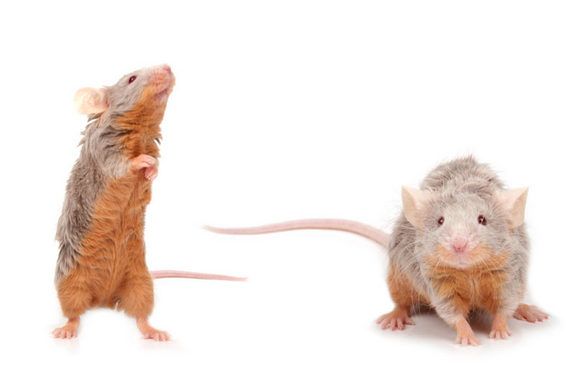Mice That Eat Yogurt Have Larger Testicles

Last summer a team of researchers from the Massachusetts Institute of Technology set out to better understand the effects of yogurt on obesity. They were following up on the results of a long-term study from the Harvard School of Public Health that had suggested yogurt, more than any other food, helped to prevent age-related weight gain. The M.I.T. team, led by cancer biologist Susan Erdman and evolutionary geneticist Eric Alm, wanted to replicate the work in mice. The researchers took a group of 40 males and 40 females and either fed the animals a high-fat, low-fiber, low-nutrient diet meant to mimic junk food or fed them standard mouse meals. They then supplemented half of each diet group with vanilla-flavored yogurt.
Their goal was to understand how a probiotic diet affects rates of obesity and its related complications, including cancer. But "the most entertaining aspects of all this were things we didn't anticipate," Erdman says.
First, the scientists noticed that the yogurt-eating mice were incredibly shiny. Using both traditional histology techniques and cosmetic rating scales, the researchers showed that these animals had 10 times the active follicle density of other mice, resulting in luxuriantly silky fur.
Then the researchers spotted something particular about the males: They projected their testes outward, which endowed them with a certain "mouse swagger," Erdman says. On measuring the males, they found that the testicles of the yogurt consumers were about 5 percent heavier than those of mice fed typical diets alone and around 15 percent heavier than those of junk-eating males.
More important, that masculinity pays off. In mating experiments, yogurt-eating males inseminated their partners faster and produced more offspring than control mice. Conversely, females that ate the yogurt diets gave birth to larger litters and weaned those pups with greater success. Reflecting on their unpublished results, Erdman and Alm think that the probiotic microbes in the yogurt help to make the animals leaner and healthier, which indirectly improves sexual machismo.
The findings could have implications for human fertility. In ongoing work, a team led by Harvard nutritional epidemiologist Jorge Chavarro has looked at the association between yogurt intake and semen quality in men. "So far our preliminary findings are consistent with what they see in the mice," Chavarro says.
This article was published in print as "Mice That Eat Yogurt Have Larger Testicles."
Sign up for the Live Science daily newsletter now
Get the world’s most fascinating discoveries delivered straight to your inbox.
This article was first published on Scientific American. © 2012 ScientificAmerican.com. All rights reserved. Follow Scientific American on Twitter @SciAm and @SciamBlogs. Visit ScientificAmerican.com for the latest in science, health and technology news.













